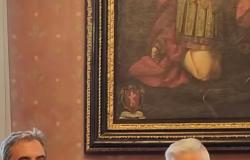They call them ‘special orphans’, but in reality they are ‘broken’ children and young people who have lost both their parents in one fell swoop. They are the children of victims of femicide, twice victims because they are deprived of the love and presence of their mother, but also of their father (because he is detained or, often, suicidal) and of the institution of the family.
In the province of Foggia, there are 19 ‘broken’ children and young people; three others were killed along with their mothers. The photograph of the ‘tragedy within the tragedy’ is presented by AnnaLucia Celentano (in the photo below), lawyer and guardian, as well as president of the Juvenile Chamber of Capitanata: “To date we count 12 women murdered in Capitanata at the hands of their husbands, 3 children killed together with their mothers and 19 orphaned by the loss of their mother and father, absent because in prison or, in some cases, who committed suicide”explains.
The ages of ‘special orphans’, as they are defined by the legislation, are very variable: “They range from children who are just a few years old to kids who are just over 18”explains Celentano who specifies: “The drama they experience, however, is the same: in addition to the irremediable loss of the parent, they are children and young people who have often also passively experienced the crime, a witnessed violence that can lead to very serious consequences and imbalances”.
Their acceptance is almost immediate: “As soon as a report of a femicide arrives, the Prosecutor’s Office transmits the documents to the Juvenile Court which appoints a special curator who can make immediate decisions for them”, explains. Once the forfeiture or suspension of the parent who committed the crime has been ordered, the curator can also become the guardian of the minor; at the same time the process for their placement begins.
From this moment on, it’s the ‘network’ that moves: “We always work online, the juridical-legal part cannot be separated from the psychological and social aspect”, precise. Representing a lifeline is the GIADA Network, a national project for the psychological support of special orphans, or ‘RESPIRO’ which offers support for inclusion and resilience paths.
There are many different ‘knots’ that a guardian must untie: “A difficult moment, for example, concerns the authorization to show, or not, the mother’s corpse to the children. It is their choice, a possibility, but the decision falls entirely on the shoulders of the guardian. The authorization (or not) always comes after discussion with the entire team: in some cases, in fact, the psychological side recommends this practice to better deal with and process the mourning and become aware of what happened”. But there are many variables and they make each case profoundly different from one another: the age of the children, the circumstances of the death, the conditions of the body.
How to behave, then? “The guardian must do what a good family man would do. And fundamentally follow the guidelines drawn up by the Juvenile Chamber of Capitanata”, continues Celentano. Another delicate moment is the start of the trial against the parent who committed the crime. “It is important to test the will, the conviction, to be (or not to be) part of the process with the constitution of a civil party”he adds.
“When children, eyewitnesses or not, are called as witnesses it is emotionally taxing. And they must be psychologically prepared to face this path with the support of the ‘network’ that comes into play before, during and after. There is a lot of preventative work to be done: we need to make him visualize the process ‘mentally’, in its function (viaticum to obtain protection and justice) and in its structure (how the courtroom is organised, how a hearing is held)”.
“We must then prepare the children for what could happen in the courtroom: intense interrogations, the vision of the parent behind bars, his search for eye contact at all costs, the tensions that can arise between the victim’s relatives and the ‘defendant. In short, all elements that can often lead to destabilizing effects.”
There are regulatory tools capable of helping ‘special orphans’ make peace with their lives. One of these is the possibility of changing the surname (this is the case of Alfredo Traiano, whose story became the subject of a short film). “The law, in this case, faces definitive condemnation”. Alfredo was the first and, at the moment, the only one in Capitanata to access this possibility: “There are currently no other requests. They are complex paths, which must be weighed very carefully: the surname identifies, and it is an irreversible choice”he points out.
THE HISTORY | Alfredo becomes Trajan, like his mother killed by his father
Changing the surname often has a double meaning: “On the one hand there is the desire to distance oneself from the person who committed the crime, on the other the desire to carry one’s mother’s surname on one’s legs as an act of revenge. Faced with brutal cases such as femicide, there are entire countries that mobilize. I have seen on more than one occasion the warmth and generosity of an entire country poured out on these children and young people. As much as the network of professionals can strive to offer them the best accommodation, the most appropriate response in terms of justice and activate the economic tools that the law makes available to their advantage, the fact remains that no one will be able to give them back a point of reference as essential as the mother”, he concludes.





